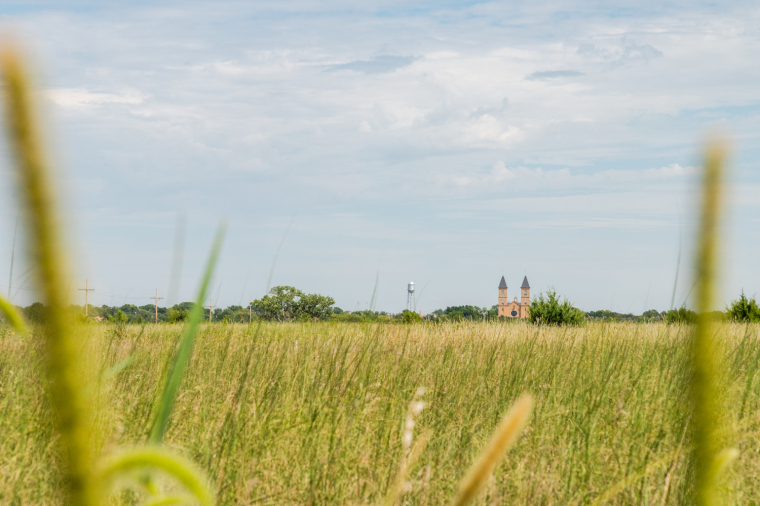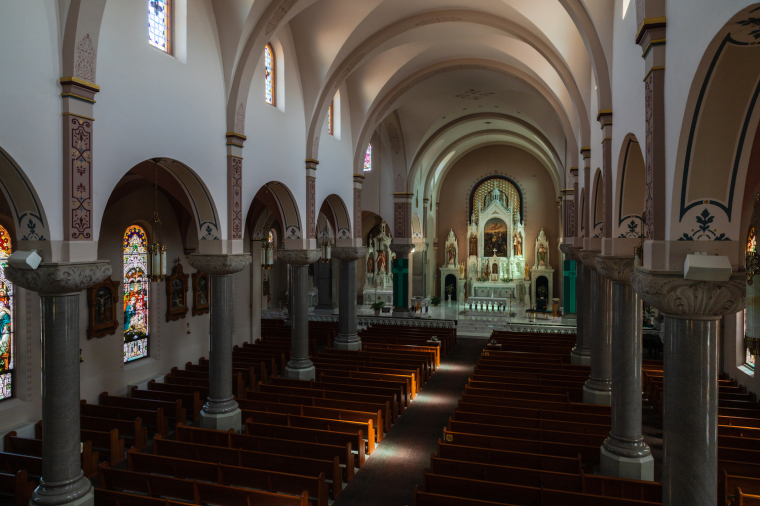
If there is one place in Kansas that looks and feels like somewhere in Europe then this is the place.
Dominating the plains for miles in every direction is what at first glance looks like a thousand-year-old abbey or cathedral somewhere in the Old World.
But this Victoria, Kansas.
With a population of just 1,129 souls at the last census, this is a small town — even by Kansas standards. Technically, Victoria is a city as at some point the state gave Victoria a charter to incorporate. Geographically, it is 340 miles from Denver and about 150 miles from Wichita, the Sunflower State’s biggest city.
Formally called the Basilica of St. Fidelis, the Roman Catholic parish church is more commonly known as the Cathedral of the Plains. Its dedication is to Fidelis, a Counter-Reformation Capuchin friar canonized by Pope Benedict XIV in 1746.
While not ecclesiastically a cathedral — cathedrals must be the seat of a bishop or archbishop –– it could double for a Romanesque cathedral from some small diocese in Germany or central Europe.
First settled in 1873 by upper-class British settlers living off remittances from their families back home, it was named after Queen Victoria. Today, there are few reminders of the gentry cowboys and farmers. Much of the population are descendants of Volga Germans.
Ethnically German, the Volgas lived for a little more than a century in Russia until persecution at the end of the 1800s drove some of them to relocate to Kansas.
Remarkably, the Cathedral of the Plains — purportedly Williams Jennings Bryant first called it that during a visit as part of one of his many campaigns for president — isn’t that old. In fact, it’s the fourth incarnation of the Roman Catholic parish church.

Built between 1908 and 1911 mostly to the design of Pittsburgh architect John Comes, it’s a spectacular example of Romanesque revival. After all, within just 40 years of its completion, the prevailing style of church architecture had shifted to hideous midcentury modern and postmodern designs.
These days, the timeless style of medieval church architecture has been more or less lost. It’s hard to visit and not think what kind of edifice might have been erected had the parish built during the postwar years.
Anyone who has ever visited Germany will instantly recognize the west front with its twin 141-foot towers and the rounded arches, the latter of which is the telltale sign of Romanesque. To be clear, this is wholly within the school of Romanesque revival, as opposed to the Richardsonian Romanesque that dominated much of the 1880s and 1890s — especially among Protestant churches belonging to Episcopalians and Presbyterians.
Some of the best views come from the interstate. For those uncomfortable with pulling onto the shoulder of I-70, you can drive down dirt roads and on two-track farm roads for epic views of St. Fidelis.
The interior is a mix. You have the rounded arches of the 14 granite piers with ornately carved capitals. At the same time, the marble high altar feels out of place as do the pews and some later elements of the church’s furnishings.
If you go
The Basilica of St. Fidelis is free to visit. A small gift shop is located directly across the side street in what was presumably once a parsonage or parochial school. For those interested in attending services, a Roman Catholic mass is held every Sunday at 10 a.m.
The free leaflet is probably sufficient for most visitors, although the guidebook sold in the gift shop is helpful for those on a self-guided visit. Supposedly, tours can be arranged but I never saw a docent.
If you’re lucky the stairs in the narthex leading to the organ loft at the west end of the nave are unlocked. The best interior views are from the loft — especially in the late afternoon when the sun shines through the rose window.
Outside of the church there really isn’t anything to do and see in Victoria. Some may be interested in the cemetery, which has a few graves from the British settlement of Victoria. For those with an interest in old churches, surrounding Ellis County has a half-dozen other Volga German churches that may be worth visiting.
The Holiday Inn Express in nearby Hays (about 15 minutes by car) is recommended for those not passing through on I-70. Otherwise, you’re probably staying in either Wichita or Denver.
Dennis Lennox writes a travel column for The Christian Post.
Dennis Lennox writes about travel, politics and religious affairs. He has been published in the Financial Times, Independent, The Detroit News, Toronto Sun and other publications. Follow @dennislennox on Twitter.
Free Religious Freedom Updates
Join thousands of others to get the FREEDOM POST newsletter for free, sent twice a week from The Christian Post.